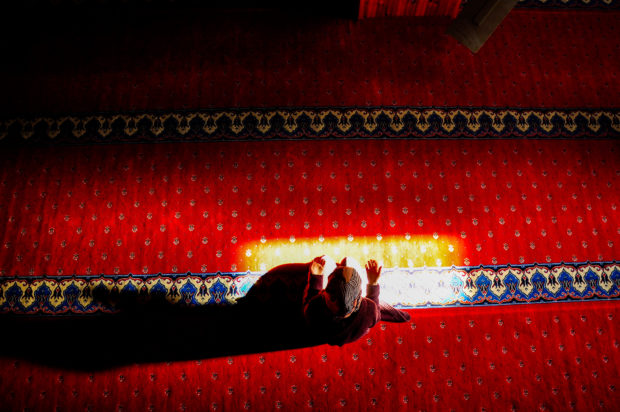The act of engraving is deliberate, repetitive, and slow. It takes time to form even a crude surface outline, to say nothing of making it presentable, or even beautiful. You must make the same motion over, and over, and over (and over) again, patiently taking away a small piece of material each time. It becomes trance-like. But you must remain focused on the task, and not be robotic in your actions. No matter when you finish, there is the feeling that you can refine it, sharpen the image, remove some abstraction from your finished artwork.
The act of engraving the name of God upon your heart is no different to the Sufi.
Sufism is a branch of Islam that emphasizes spirituality and mysticism. Having a close and loving relationship with the Almighty is one of the chief goals of the Sufi, beyond just slavishly following the divine laws set forth in the holy books. It is a deliberate act to embrace Him.
The Naqshbandi Order of Sufism derives its name from two Farsi words, first “to engrave” (naqsh) and then to form a bond “bandi.” According to Madani Sheikh, a devotee of The Most Distinguished Naqshbandi Sufi Order of New York and New Jersey, this refers to carving the name of God upon the heart of the Sufi while forming bonds back to their spiritual teachers (called Mawlana, “Our Master”).
In order to carve the name of God onto their hearts, Sufis sing chants and meditate upon the words they hear, over and over and over again. One of the hymns they sing, The Opening Qasida, has 24 verses that each begin with “Yā Rabbi sallī ‘alā Muhammad” (“O Lord, bestow blessings upon Muhammad”). Another is 64 verses long, and takes over 10 minutes to sing.
A unique part of the Sufi worship is done towards the end of the service, after the night prayers are finished. Worshippers form a ring on the rugs they have carefully laid out on the floors, facing each other. As with all other parts of the service, the women and men sit separately. The faithful close their eyes, cross their legs, and place their open hands upon their knees, palms facing upwards. They wait silently, patiently, for their leader, Shaykh Diomande Soulieyman, to begin the chants.
At Soulieyman’s direction, Sheikh stood up, walked over to the light panel, and darkened the room. Only a few lights in the massive space were left on, just enough to illuminate the exits. The Sufis were shrouded by the darkness.
Soulieyman began to sing. He sung minutes-long verses that repeated four or five times apiece, his tone rising and falling. In the dim light, the Sufis swayed gently in time to his melodies. As the Shaykh sung into his microphone, connected to a powerful sound system, his followers could hardly be heard singing alongside. On the rare occasion he takes a breath though, their voices come through clear and harmonious.
The air of the darkened room was filled with their meditative chants. It did not matter that there were only 30 Sufis here, nor that they had to worship in an Episcopal Church on 28th Street because they had no Mosque of their own. It did not matter. For the moment, this was not a place of pulpits and altars, not one of a small community in a big city, not even one of sight. This was a place for God.
After 45 minutes, the chants slowly faded out with a long, mournful note. Sheikh quietly rose again and turned on the lights, which felt almost jarring after the extended trance of the meditation. The worshipers took each cupped their hands and brought them to their face as if splashing themselves with water. They had received God’s blessings through their meditation, and were spreading His gift over their skin.

Soulieyman delivered a brief sermon, less than 10 minutes long, and everyone rose from their seated position. The service was over, and now it was time to share a meal.
They shared kabobs and lentil soup with lamb, drank a pineapple-ginger juice popular in West Africa, and chatted about life. They hadn’t been able to meet the week prior due to a snowstorm, and a few of them commented on how pronounced the absence felt after just a week. After such a powerful, transcendental experience in the dark, it’s hard to imagine missing even one service. The engraving on their hearts was made a little deeper that evening.
